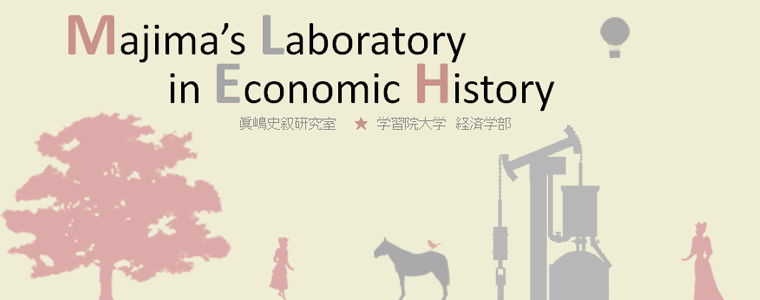一般経済史特論 I & II(学部:一般経済史上級 I & II)
Advanced Course: General Economic History I & II
大学院生が経済史の既往文献の内容を自ら的確に評価できるよう,時代性・専門性の双方を視野に入れて理解を深めていくことを授業の目的としていますが,大学院レベルについていけるような一部の優秀な学部生が受講することも可能です.学部生の場合は,一般経済史を既に良い成績で修得していること,もしくは本年度同時に履修し好成績を残す自信があることが受講条件です.一般経済史の講義内容をグローバルな視点からより深く理解するために,対応する多くの文献(英語の学術論文を含む)を読み,受講生が交代でプレゼンテーションおよびディベートを行っていきます,また、レポート執筆指導も随時行っていくことにより,大学院レベルで必要な文章表現力も養成していきます.歴史的なケーススタディを用いながら,経済的な意思決定プロセスの選択肢を吟味し、それぞれ経済学的見地の長所短所を明らかにしていく能力を身につけることが主な狙いです.
課題図書・参考文献について
課題図書 〔I〕R.C. Allen,British Industrial Revolution in Global Perspective. Cambridge University Press, 2009.〔II〕R. Findlay and K.H. O'Rouke, Power and Plenty.Princeton University Press, 2001.
参考文献は法経図書センターに配架してあります.
課題図書に限らず,多くの本を読んで、自分なりの理解を深めてください.
レジュメについて
各回,報告担当者はレジュメと文献リストを前日までに眞嶋研究室へ提出します.
Advanced Course I: グローバル経済史のなかの産業革命
- Methods of Global Economic History
- The Industrial Revolution and the pre-industrial economy
- The high-wage economy of pre-industrial Britain
- The agricultural revolution
- The cheap energy economy
- Why England succeeded
- Why was the Industrial Revolution British?
- The steam engine
- Cotton
- Coke smelting
- Inventors, Enlightenment and human capital
- From Industrial Revolution to modern economic growth
- Collective Invention
- データ収集・分析方法に関する指導(統計資料の利用法の指導)
- 学期末レポートに関する指導(テーマ選び・執筆体裁指導・文章表現力指導)
Advanced Course II: グローバル経済はどのように成長してきたか?
- Methods of Global Economic History 1: Ancient Future
- Methods of Global Economic History 2: Historiography of Global History
- Methods of Global Economic History 3: Economics of Global Trade
- Geographical and Historical Background
- The World Economy at the Turn of the First Millennium
- The Economic Consequences of Genghis Khan
- Old World Trade and New World Silver
- The Age of Mercantilism
- Trade and the Industrial Revolution
- The Great Specialization
- The Two World Wars and Deglobalization
- Reglobalization in the Late Twentieth Century
- Globalization and Economic Growth in the Twenty-First Century
- データ収集・分析方法に関する指導(統計資料の利用法の指導)
- 学期末レポートに関する指導(テーマ選び・執筆体裁指導・文章表現力指導)
西洋経済史特殊研究 & 西洋経済史演習
Special Lecture & Seminar: History of the Western Economies
The courses are available to full-time postgraduate students and non-degree credit-earning students, who are interested in economic history from global perspective and intend to write thesis related to these themes. The special lecture and the seminar may be delivered in English, depending on the language proficiency spoken by the students. The theme and the textbook may change according to the students' academic interest.
Special Lecture:土地と法制度の経済史
This course provides an opportunity to view the theme of landownership and development from an economic perspective, and to consider its origins, its responsive strategies, its relations with adjacent disciplines such as law and politics. Students are encouraged to see the both sides of alternative explanations and decisions, and to highlight their respective strengths and limitations in their own words.
〔Text book〕Avner Offer, Property and Politics 1870-1914, Cambridge University Press, 1981.
In general, this course aims to prepare postgraduate students to evaluate academic works in economic history.
- Introduction: property and politics
- A Benthamite project: land-law reform
- Lawyers and Liberals
- The property cycle
- Clergy and corporations
- Landowners and entrepreneurs
- Mortgagees
- The doctrines of taxation
- The country versus the city
- Local taxation
- Doles for squire and parson/li>
- Towns against the Tories
- Towards the People's Budget
- Rural land campaign
- The urban question again
Seminar:消費とファッションの経済史
This course provides an opportunity to view the theme of fashion and textile from an economic perspective, and to consider its origins, its responsive strategies, its relations with adjacent disciplines such as marketing and management. Students are encouraged to see the both sides of alternative explanations and decisions, and to highlight their respective strengths and limitations in their own words.
In general, this course aims to prepare postgraduate students to evaluate academic works in economic history.
- Introduction: textile history and economic history
- Shepherd's paradise and queen's wardrobe: (1) the seventeenth century
- Shepherd's paradise and queen's wardrobe: (2) port book records
- Clockwork folly and whale fins: (1) the eighteenth century
- Clockwork folly and whale fins: (2) population reconstruction
- Goddess with fluttering muslin: (1) the nineteenth century
- Goddess with fluttering muslin: (2) factory returns
- The little black dress: (1) the roaring twenties
- The little black dress: (2) social network analysis
- Miniskirts and the white-coated men: (1) the swinging sixties
- Miniskirts and the white-coated men: (2) family expenditure survey
- Perfume and armour: (1) the turbulent noughties
- Perfume and armour: (2) annual report and financial statements
- Conclusion: fashion and business in historical perspective
- Evaluation of academic papers in economic history and textile history
学期末レポートについて
Global & Local: 身近な関心を掘り下げて
課題図書の内容をふまえた上で,ふさわしいと思われるテーマを自分で設定し,そして課題図書との関連がわかるようにテーマについて説明しながら執筆しましょう.
何をテーマに選ぶかも採点の基準のひとつです.また,課題図書と内容的に関係のないレポートは評価の対象としません.
レポートの体裁について
A4版縦型・横書き・10.5ポイント・明朝体・1行に40字・1ページに36行以上・タイトルページを入れずに本文4ページ程度(5500字程度).
タイトルページには,レポートのタイトル・学部・学科・学年・学籍番号・氏名を記入してください.「導入部」もしくは「はじめに」と「結論」もしくは「おわりに」を400-600字ずつほどにまとめて本文の最初と最後につけ,議論の部分もいくつかの節に分けて,節ごとに短いサブタイトルをつけるのが良いです.
本文には,脚注とページ番号を入れ,文末には,参考文献表を添えます.脚注は簡略に著者名と出版年とページ数を記してもよいですが,参考文献表はしっかりと,本文末に一般的な参考文献表の体裁などに従って作成してください.(例:著者名,『著書タイトル』出版社,出版年)
統計表やグラフなどの使用は歓迎しますが,字数には換算しないので,文末にまとめて貼付し,表やグラフにも必ず統計データの出所を明記してください.
他人の文章から引用した文やフレーズには脚注をつけるのが礼儀であり,引用文に脚注がない場合(特に本やウェブからの丸写し)は,盗作・剽窃という犯罪にあたるので,注意してください.他人の文章を書き写すようなレポートではなく,自分の意見を伝え議論することを目的としているので,どうやって自分の考えをまとめ,そしてどう伝えていったらよいかをよく考えてみましょう.
ただし,根拠のない私見だけのレポートというのは学問的に無意味ですから,参考文献などをよく読み,自分の意見の根拠となる文章を正しく引用して,説得力のある議論を展開するように心がけてください.
問題点のご指摘・お問い合わせなどございましたら眞嶋史叙までお知らせください。
Updated: 2023-05-07
